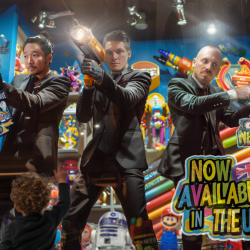The theme of masks and the extent to which we wear them made me think immediately of the following quote from As You Like It:
‘All the world’s a stage, and all the men and women merely players. They have their exits and their entrances; And one man in his time plays many parts.‘
We sure do play many parts, and it would be weird not to. Try reading a bedtime story to a toddler in the same way that you pitch a new account at an ad agency.
Human masks are essential, ubiquitous and used without conscious thought, but does the same apply to the masks used by brands?
I’d argue that a colossal amount of expensive conscious thought goes into the development of most brands’ masks. This is because what they do or do not disguise can be far more resonant, with far greater consequences. Take, for example, the relatively recent rise in DEI initiatives. Did the corporations of the world suddenly wake up one day and realise that including previously marginalised minorities in their operations and communications was the right thing to do?
Call me cynical, but I don’t think that happened. Instead they saw which way the wind was blowing, put a mask on, increased the DEI, and our impression of them changed.
Did it change for the better? That’s another question. The thing about corporate masks is that we expect them to exist, so we tend to take them with a pinch of salt: from advertising claims that exaggerate true benefits until they become unrecognisable, to greenwashing, woke-washing and rainbow washing, brands always do whatever they can to make people think more positively of them.
(The only time I’m aware of masks going in the other direction is Ryanair’s apparent wish to be thought of as arseholes. Maybe the owner is truly like that; maybe not, but it seems as if they take any opportunity to seem mean, penny-pinching and rude. But that actually helps us to make sense of the low prices. We end up feeling as if there can’t be a mask because they seem as if they’re not trying to hide anything. It’s a mask on a mask, and it works like a charm.)
The most depressing example of insincere brand masking is the way in which so many of them change their logos in June to proclaim their support for Pride Month. How do we know this is a mask and not a genuine stance? First we can watch as that rainbow flag disappears on July 1st, but more egregiously we can see that, even in June, the logo does not change in the Saudi version of their social feeds.
One mask for one audience; another mask for the other. But which is the real face of the company?
Do Vogue, Pfizer or General Electric truly care about the rights of LGBTQ+ people (including those they employ) or are they happy to exacerbate their marginalisation? Which mask is the real mask? The answer is almost always complicated.
Corporations are not a single person, and even if they were, they might still feel the need to present different faces to different audiences. Having a multinational presence, reacting in real time to important and complex issues and coping with the demands of people on social media to ‘take a stand’ in one direction or the other are tough mazes to navigate. Look at Israel and Palestine. Corporations are now being asked to weigh in on one of the most intractable geopolitical situations in history. Decades of the world’s greatest statesmen and diplomats have not found a workable solution; why should McDonald’s?
Let’s face it: the ultimate goal for most brands is the acquisition of cold, hard cash, and if a new mask aids that acquisition then they will not hesitate to put it on. Look at all the masks Adidas had to use when Kanye West started selling billions of dollars of sneakers while making antisemitic statements.
- Mask one: we’re cool enough to get Kanye to design our sneakers
- Mask two: we’re all about the shoes (what antisemitism?)
- Mask three: we are shocked at this terrible behaviour (that we knew about for years) which goes against our core principles. Contract cancelled!
The fact that they are now hoping we don’t hold it against them as they sell their old stocks of Yeezys (which will massively enrich Kanye) is a further demonstration of their devotion to masks and money.
Featured image: Lucas Pezeta / Pexels


























